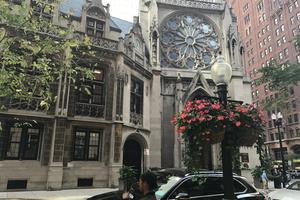Fostering Safe Environments in the Church
COMMENTARY: The U.S. bishops’ June 14 penitential Mass for survivors of sex abuse comes on the 15th anniversary of the Dallas Charter.

On June 14, as they begin the spring meeting of the U.S. Conference of Catholic Bishops (USCCB) in Indianapolis, the bishops of the United States will celebrate a “Mass of Prayer and Penance” for survivors of sexual abuse within the Church.
This is a good and important occasion. Sexual abuse is a heinous crime, one that cries out for penance and prayer. This is especially true when the Church, the sacrament of salvation, is the setting in which sexual abuse has taken place, violating sacred trust and causing real spiritual harm.
The survivors of sexual abuse within the Church have suffered gravely and, in many cases, will continue to suffer in relationships, in health and in faith. The Church does well to continue praying for them and to continue making penance for the grave sins perpetrated against them.
The Church also does well to continue supporting survivors of sexual abuse by clergy or other church personnel, providing them resources for psychological assistance, pastoral care and personal healing.
The July 14 penitential Mass comes on the 15th anniversary of the “Charter for the Protection of Children and Young People,” the document known as the “Dallas Charter,” that the bishops passed at their spring meeting in 2002.
Since they issued the Dallas Charter, the U.S. bishops have spent hundreds of millions of dollars, and thousands of work hours by competent professionals and advisers, to foster a culture of child protection.
Children are trained to recognize unsafe situations and report them to trusted adults. Priests, deacons, teachers and catechists are trained to recognize the signs of child abuse and respond appropriately. Background checks have helped to screen potential abusers preying on children.
Diocesan lay review boards have assisted bishops in addressing these issues and holding them accountable.
Prompted in part by the U.S. bishops, the Vatican also has done a great deal to address the problem of sexual abuse since 2002.
In 2005, the Congregation for Catholic Education issued norms addressing homosexual inclinations — the source of many incidents of abuse — among aspirants to the priesthood. Bishops and seminaries have integrated these guidelines into their application processes.
In 2010, the Congregation for the Doctrine of the Faith (CDF) issued new canonical norms addressing the problems of pornography and the abuse of vulnerable adults. In partnership with canon law societies and the USCCB, the CDF has offered training and resources to diocesan canon lawyers tasked with investigating and prosecuting allegations of sexual abuse.
Neither the Dallas Charter nor the Vatican’s norms are perfect. And the Church still has improvements to make in its safe-environment policies.
In some dioceses, policies have become onerous, a violation of rights or unreasonably directed at clerics, inadequately addressing the causes of abuse or the potential for abuse by lay teachers and other Church employees. Especially in the Dallas Charter’s early years, bureaucrats have sometimes operated with a hermeneutic of suspicion and mistrust.
Despite the growing pains and room for improvement, in the 15 years since the Dallas Charter, the Catholic Church in the United States has become one of the safest places for children anywhere in the world.
Many of the bishops who will celebrate the Mass of Prayer and Penance were not in attendance at the Dallas meeting, because they were not yet bishops. Most of the bishops who passed the charter have since retired.
Those who will be in Indianapolis at the bishops’ spring assembly are mostly their successors. The bishops who will offer prayer and penance to the Lord this week are, for the most part, not the ones who created or enabled the problem of sexual abuse in the Church.
Instead, they are the ones who have continued the work to solve the problem.
Culturally, though, the Catholic Church is regarded often still as a haven for sexual abuse and nefarious cover-ups. The facts don’t support that stereotype. But the stereotype makes it easy for members of the media to criticize the Catholic Church, without paying adequate attention to the problem of sexual abuse in other environments.
In 2014, the Government Accountability Office reported on the serious problem of sexual abuse in public schools, noting that “states and school districts … miss opportunities to prevent and respond quickly and effectively to child abuse by school personnel.”
The same problem exists in prisons, facilities for the disabled and mentally ill and health care institutions. Powerful unions, friendly media and reluctant legislatures pay insufficient attention to those problems.
The bishops of the Catholic Church know the consequence of “missed opportunities” to prevent and respond to child abuse. They know the damage that inaction can cause. They also know what it takes to foster safe environments. The bishops of the United States are well-positioned to defy the stereotypes of the past and to call other institutions to change. Learning from the lessons of the past, the Church can be a leader in fostering safe environments in America’s public institutions. The bishops can call on other institutional leaders to hold themselves to the high standards which have become the norm in the Church.
The bishops offering prayer and penance for the survivors of sexual abuse are leaders committed to ensuring a safe environment for children and vulnerable adults. May their witness be a call — to all institutions — for accountability, transformation and leadership.
J.D. Flynn is a canon lawyer who lives in Lincoln, Nebraska.
- Keywords:
- charter for the protection of children and young people
- dallas charter
- protecting children
- protection of young people
- u.s. bishops
















